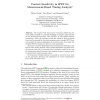Free Online Productivity Tools
i2Speak
i2Symbol
i2OCR
iTex2Img
iWeb2Print
iWeb2Shot
i2Type
iPdf2Split
iPdf2Merge
i2Bopomofo
i2Arabic
i2Style
i2Image
i2PDF
iLatex2Rtf
Sci2ools
187
click to vote
ISOLA
2010
Springer
2010
Springer
Context-Sensitivity in IPET for Measurement-Based Timing Analysis
Abstract. The Implicit Path Enumeration Technique (IPET) has become widely accepted as a powerful technique to compute upper bounds on the Worst-Case Execution Time (WCET) of time-critical software components. While the technique works fine whenever fixed execution times can be assumed for the atomic program parts, standard IPET does not consider the context-dependence of execution times. As a result, the obtained WCET bounds can often be overly pessimistic. The issue of context-dependence has previously been addressed in the field of static timing analysis, where context-dependent execution times of program parts can be extracted from a hardware model. In the case of measurement-based execution time analysis, however, contexts must be derived from timed execution traces. resent extended abstract we present an overview of our work on the automatic detection and exploitation of context dependencies from timed execution traces.
| Added | 13 Feb 2011 |
| Updated | 13 Feb 2011 |
| Type | Journal |
| Year | 2010 |
| Where | ISOLA |
| Authors | Michael Zolda, Sven Bünte, Raimund Kirner |
Comments (0)

